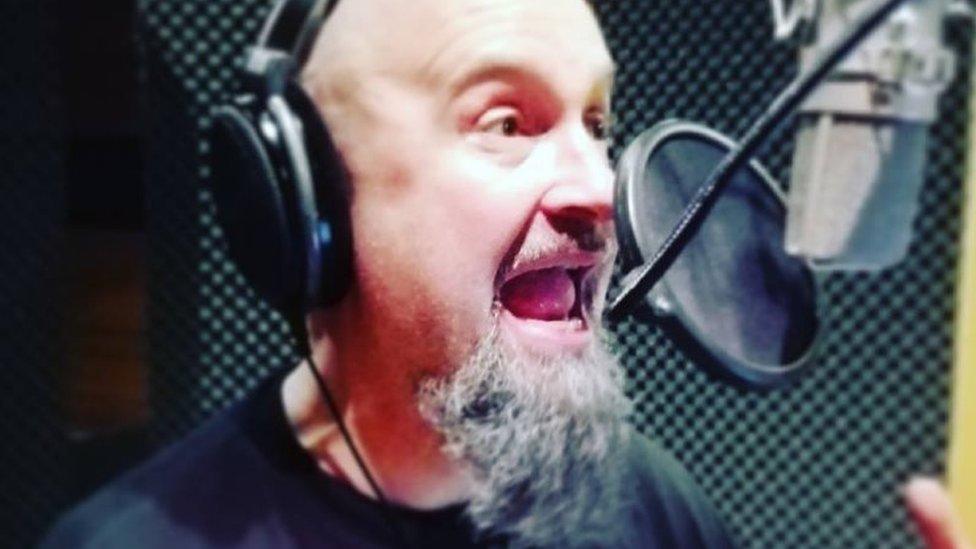Spain: Rapper Pablo Hasel who fled to university sent to jail
- Published
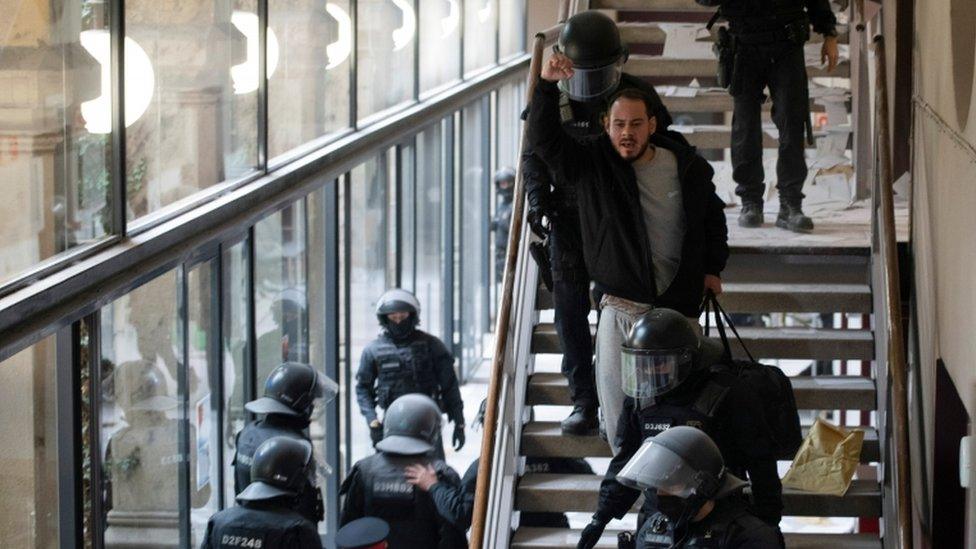
Pablo Hasel was taken from the University of Lleida early on Tuesday
Spanish rapper Pablo Hasel who barricaded himself inside a university to avoid a jail term has been arrested.
Catalan police entered the University of Lleida and detained him a day after he arrived there with supporters.
Hasel is facing a nine-month jail term for glorifying terrorism and slandering the crown and state institutions over tweets and lyrics that attacked the monarchy and police.
He was due to hand himself in last week but defied the order.
Almost two hours after officers from the Mossos police force went in early on Tuesday, Hasel was led away shouting "they will never silence us; death to the fascist state".
He was driven away to the nearby Ponent prison, where he will begin serving his sentence, reports say.
Dozens of supporters had earlier built a barricade at the university in Lérida (Lleida in Catalan), 150km (90 miles) west of Barcelona. Pictures from the scene showed activists spraying fire extinguishers at police before he was arrested in the university rector's building.
Allow X content?
This article contains content provided by X. We ask for your permission before anything is loaded, as they may be using cookies and other technologies. You may want to read X’s cookie policy, external and privacy policy, external before accepting. To view this content choose ‘accept and continue’.

On Tuesday night protests broke out in cities across the country. In Barcelona thousands gathered, waving placards reading "Free Pablo" before the protests turned ugly as police charged and demonstrators set rubbish bins on fire.
Many also chanted calls to free leaders of Catalonia's independence movement, a cause that Hasel supports. Nine were jailed in 2019 after organising an independence referendum for the region two years earlier that the Spanish government called illegal.
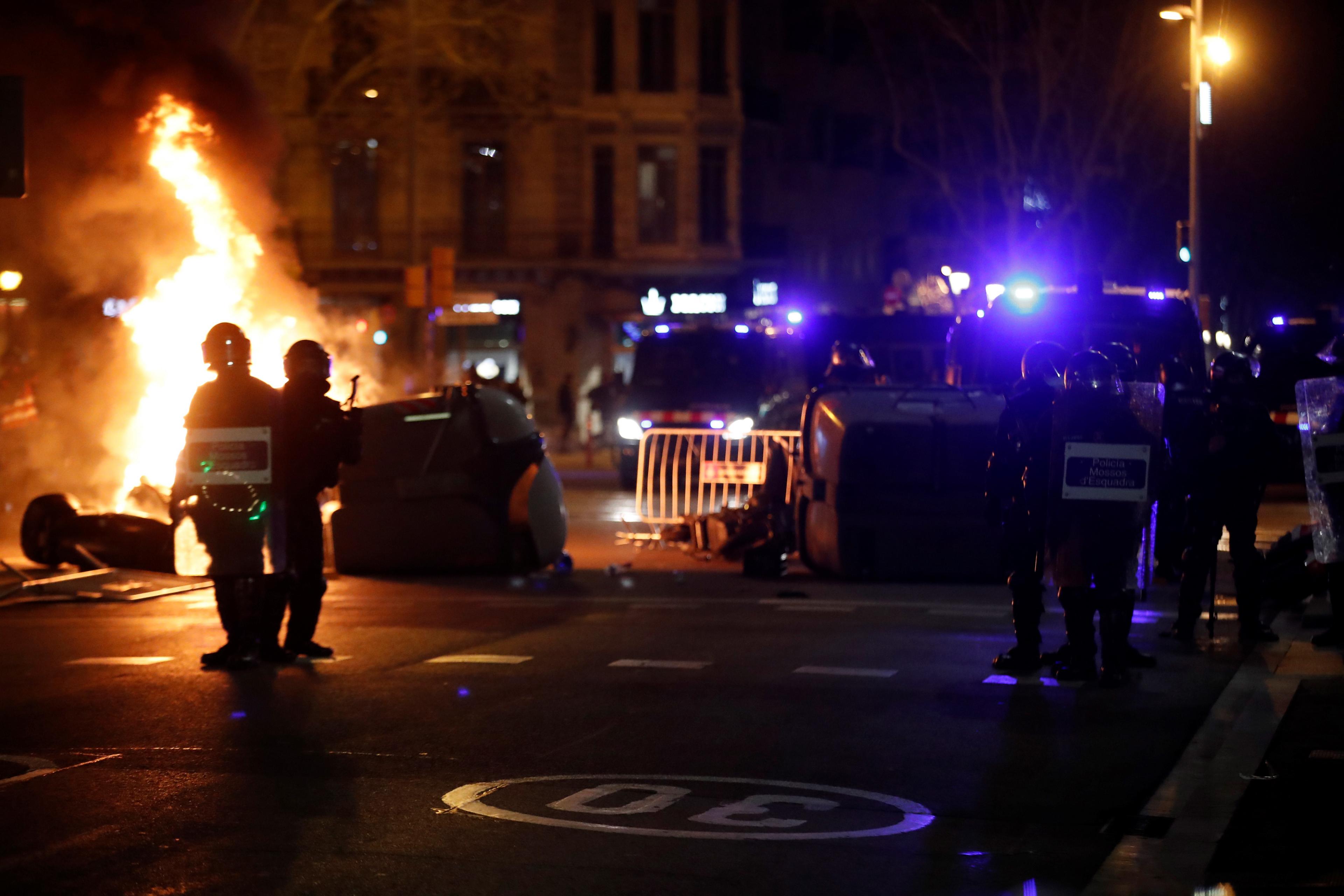
Protesters set fire to rubbish bins on Tuesday in Barcelona
A spokesman for the Catalan police force told the AFP news agency that officers had entered the university "to enforce the judicial ruling".
More than 200 artists, including film director Pedro Almodóvar and Hollywood star Javier Bardem, had signed a petition against his jail term, which was upheld by a Spanish court on Monday. Amnesty International tweeted that Hasel's arrest was terrible news , externalfor freedom of expression in Spain.
Hasel tweeted overnight that he would go to prison "with my head held high" if he was taken away. "We cannot allow them to dictate what we can say, what we can feel or what we can do," he tweeted, adding that he had chosen not to go into exile abroad.
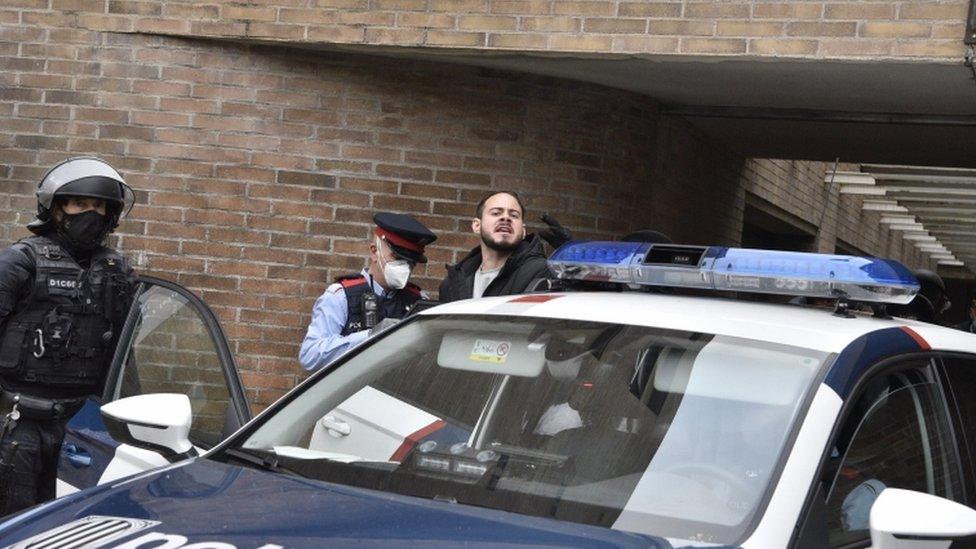
Hasel shouted to reporters as he was led away by police and then driven to prison
The Spanish government said last week it planned to reduce the penalty for "crimes of expression" such as the glorification of terrorism, hate speech and insults to the crown and religion, in cases that involve artistic or cultural activities. Besides attacks on the monarchy, Pablo Hasel's tweets and lyrics accused police of torturing and killing demonstrators and migrants.
The singer was found guilty of glorifying terrorism in a separate case in 2014, but his prison sentence was suspended in 2019 on condition that he did not reoffend within three years.
In one message Pablo Hasel - real name Pablo Rivadulla Duro - expressed support for Victoria Gómez, a jailed member of the banned Marxist group Grapo. Elsewhere he accused King Felipe VI and his father Juan Carlos, the former king, of several crimes.

Spain's freedom of speech controversy
By James Badcock, Madrid
Pablo Hasel will become the highest-profile person to have actually gone to prison for a speech crime in Spain in recent years. But his case is only one of many that have caused controversy.
Several other performers and bloggers have fallen foul of the criminal offence of "glorifying terrorism", which is framed so broadly that any example of justifying a terrorist act, even if it took place a long time ago, can lead to a conviction.
In 2018 the rapper Valtònyc had his jail term confirmed by Spain's Supreme Court, for glorifying terrorism and insulting the monarchy with his promises of bullets for right-wing politicians and a noose for the king.
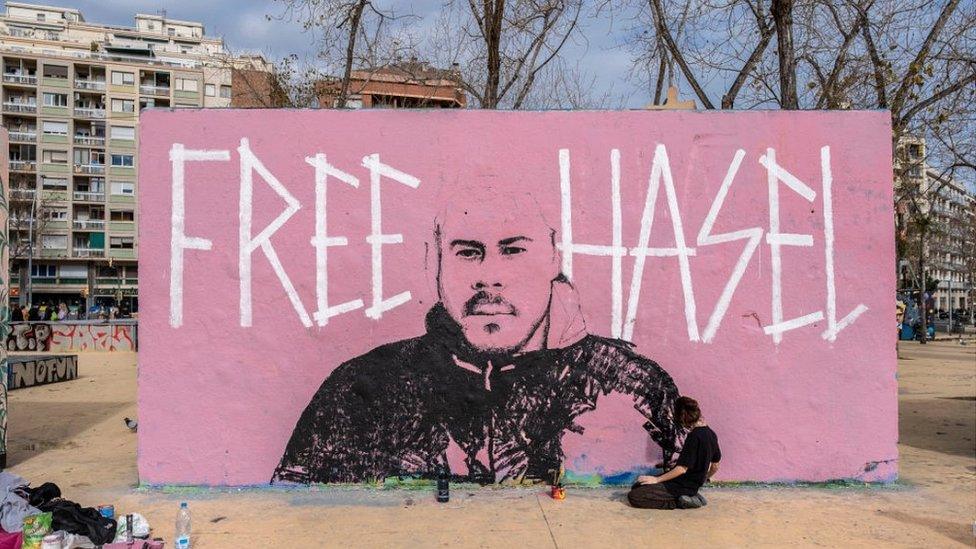
A pro-Hasel mural in Barcelona
The year before, Twitter user Cassandra Vera had been sentenced to prison for merely making jokes about the 1973 assassination of Gen Franco's number two, Adm Luis Carrero Blanco, in a bomb attack by Eta Basque militants, although she was acquitted on appeal.
The government has promised to review the law. The legal framing of speech crimes might seem a dry, academic subject, but an explosion of graffiti artwork in Spanish cities in defence of Hasel in recent days suggests that many among Spain's youth believe there is a real issue of freedom at stake.

You might also like:
Iranian rapper Justina on facing jail in her country, where women are banned from singing solo
Related topics
- Published15 February 2021
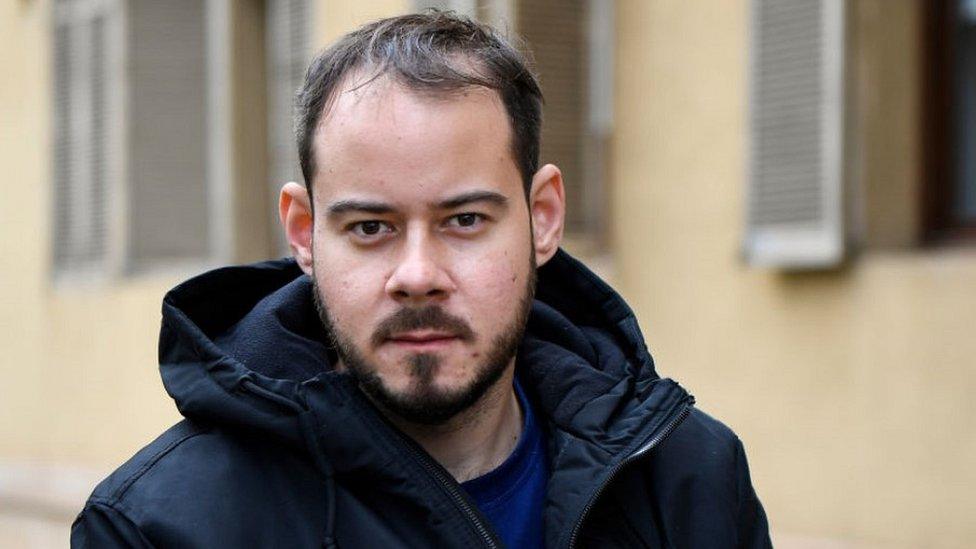
- Published15 February 2021
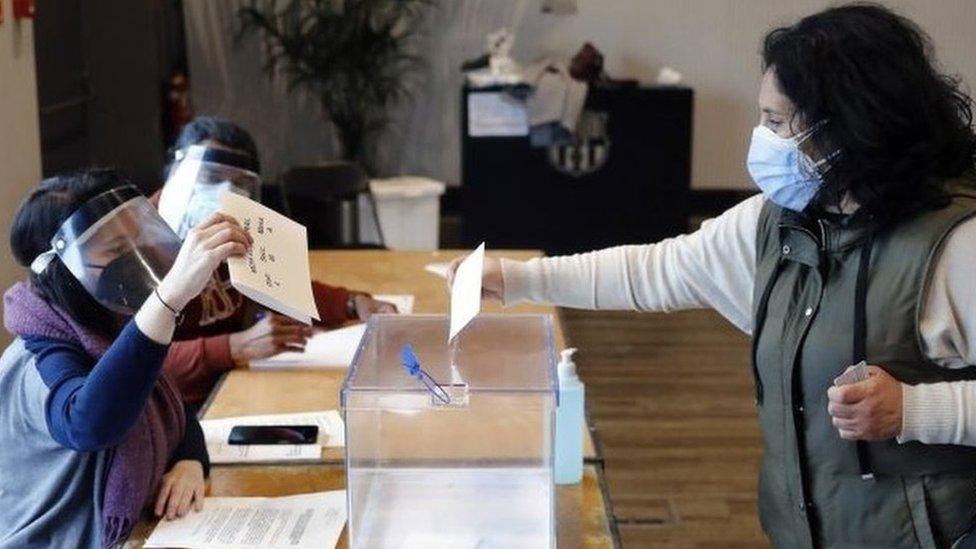
- Published19 July 2020

- Published17 September 2018
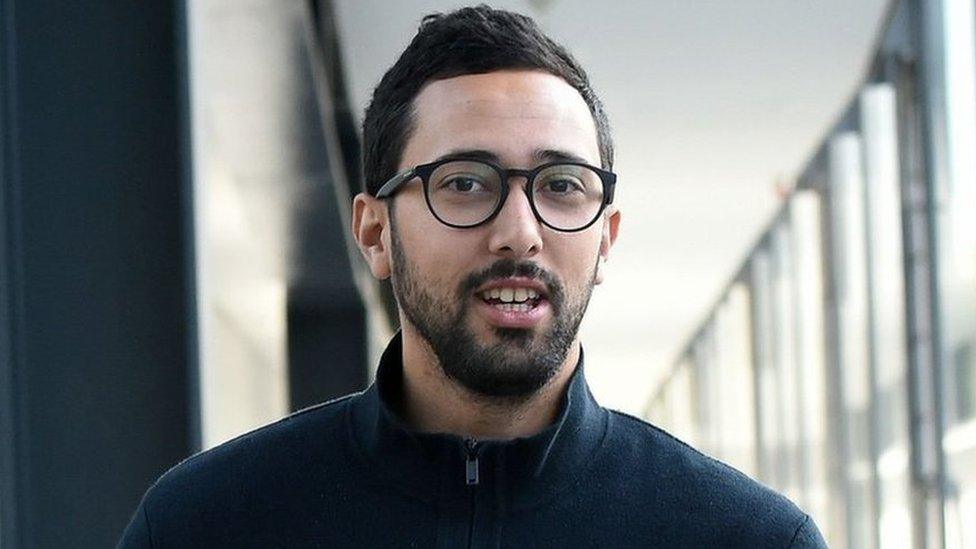
- Published17 March 2018
